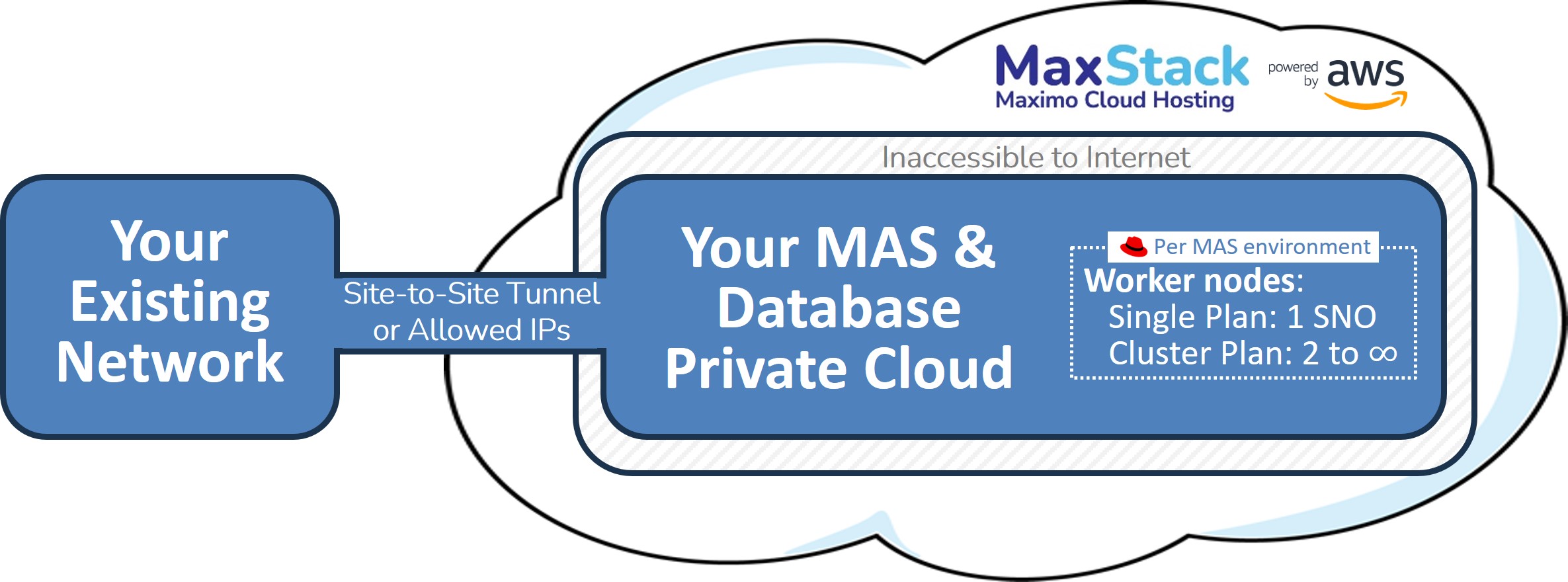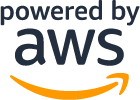You may be wondering what the difference is between MaxStack and MAS SaaS offerings from other vendors. There are four main differences:
1. Cost Savings
MaxStack is significantly more affordable. That’s true whether you use our MAS Single SNO plan or our larger MAS Cluster plan with 2 to ∞ nodes where Red Hat creates and manages the control plane for your system.
2. More Control
MaxStack provides you with more control than other MAS SaaS options.
3. Single Tenancy
MaxStack automatically creates dedicated and isolated infrastructure to power Maximo Application Suite for your organization.
MAS SaaS plans from other providers use multi-tenant hosting and create a “namespace” sub-cluster for your MAS system in a shared environment. In other words, you get a “slice” of a shared cluster used by other organizations. In contrast, MaxStack automatically creates the resources needed for your MAS application at the server level.
This means you do not share your Openshift installation or the servers for your MAS system (vCPU, RAM, storage, etc.) with other companies – you have your own isolated environment.
Another major benefit of non-shared MAS clusters is it enables MaxStack to put your MAS systems and databases into a virtual private cloud (VPC). Your private cloud (essentially a private and secure LAN) can be secured so that only your user locations and your integrated systems can reach it. This is done either via “allowlisting” network addresses, or by attaching your MAS VPC to your organization’s network using a site-to-site VPN tunnel.
The site-to-site tunnel option makes your dedicated MAS environment a secure satellite extension of your organization’s existing network.

4. True “Lift and Shift” to Cloud
If you have integrated Maximo with other systems, moving to a dedicated Private Cloud MAS deployment means your integrations will continue to work as-is. That’s because Maximo will still be able to communicate with your other systems and your database will still be accessible too, whether your external systems are on-premises or in the cloud.
Comparison Chart
Fully Managed SaaS
Single Node Openshift (SNO) Option
Dedicated (Non-Shared) Servers
Private Cloud (VPC)
Multi Zone High Availability
Site-to-Site VPN Tunnel
Allowlisting Supported
Production Database Access
Option to Install 3rd Party Add-Ons
Unlimited Maximo Users
(purely governed by App Points)
Free Hosting Trial Period
Time to Provision
Recovery Point Objective (RPO)
BYOL Option
BYOC Option
Maximo 7.6 to MAS 9 Upgrade Cost
Hosting Cost
Move to Another Provider Anytime
MaxStack
4 Hours
24 Hours
Free to $
$ to $$
Others
Ask
Some limit you
Ask
72 Hours
Ask
Ask
$$ - $$$$
$$ - $$$$
Ask
MAS and Openshift updates are managed for you.
If you have less than 50 concurrent users we can provide much greater cost savings than you will find anywhere.
You get dedicated Red Hat servers.
With other MAS SaaS providers, your MAS application is running on shared clusters, unless you pay a premium for a custom deployment and hosting.
All of your servers are secured in VPC private networks. Others hosting providers can't do that when they have you sharing servers with others.
Our Cluster Plan creates your worker and control plane servers in multiple availability zones for resiliency.
Your VPCs (containing your MAS app servers and database server) can be connected to your company network so no traffic flows over the internet. (Satellite as a Service)
You can allow specific IP addresses or external systems to reach Maximo while blocking all others.
If you've ever supported Maximo, you know that having database update access is sometimes a necessity. This is tightly controlled of course.
Need to install 3rd party add-ons like EzMax or others? That's supported in our standard plans.
Some other SaaS hosting plans limit the number of users you can add, even though your licensed App Points are what control usage.
Contact us for your trial.
Our automated provisioner creates both the infrastrucure (servers and databases) for your MAS system and installs the applications (e.g. Manage, Health, and others). We can spin up a new MAS system and VPC for you quickly at any time.
Other MAS SaaS hosting providers have very long RPO, likely due to not having isolated customer systems. MaxStack can recover or even create a new MAS instance quickly. You can even have a cold spare MAS instance.
You can bring your own MAS license (from IBM or your 3rd party consultant) or MaxStack can provide.
You have the option to use your preferred qualified Maximo consultant or in-house resource for Maximo configuration and support.
We enourage you to get competitive quotes for this. One of our Maximo clients got a $300K quote. We upgraded them for free the next day.
We encourage you to get hosting quotes from other providers and compare to our prices.
Easily move your MAS database to another SaaS or hosting service if needed (avoid vendor lock-in).
MaxStack is unique in that we provide only turnkey dedicated Maximo Application Suite (MAS) systems in the cloud. We’re able to make this superior dedicated MAS option affordable for even smaller / SMB organizations using Red Hat-supported deployment architectures.
See which MaxStack hosting plan is right for you: MaxStack Hosting Plans



